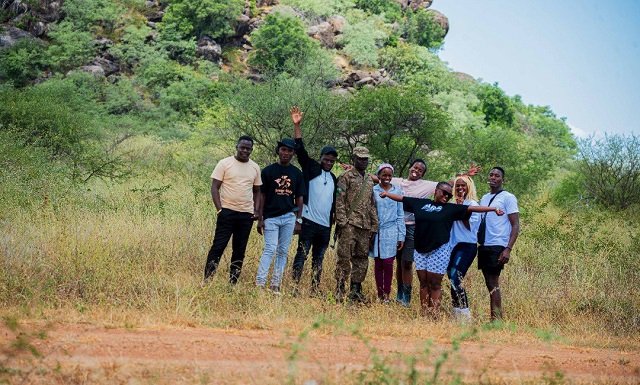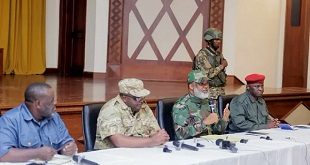
Currently, 62% of rangers lack any life insurance and 40% need more health and safety training, according to the International Ranger Federation
ANALYSIS | RONALD MUSOKE | In a week which saw a Uganda Wildlife Authority (UWA) ranger, Pte Jonathan Ojara, succumb to a poacher’s bullet while on patrol of a section of the vast Kidepo Valley Conservation Area in northeastern Uganda, the Prince of Wales launched a new insurance programme for about 10,000 African wildlife rangers.
The groundbreaking programme will see thousands of men and women who work on the frontline of conservation get healthier, safer, and better protected if they are injured, including fatally.
The Ranger Welfare and Standards Initiative will provide thousands of African wildlife rangers with expanded access to suitable and affordable work and medical evacuation insurance over five years, together with opportunities for training and leadership development.
Guardians of wildlife
All around the world, rangers are the guardians of biodiversity. Their role is fundamental to environmental security and human wellbeing, and to safeguarding nature for future generations. Rangers also play a vital role in reaching the Global Biodiversity Framework targets including the “30×30 goal” of protecting 30% of the world’s land and oceans by 2030.
But thousands of rangers are frequently exposed to life-threatening situations and their efforts to safeguard threatened species, habitats and local communities is under-valued and under-respected. Poor remuneration and working conditions, long hours, and a lack of basic training and equipment are common.
Take the example of Pte Ojara who was fatally shot on Nov.4 during an encounter with armed poachers while on patrol within the Karenga Community Wildlife Area. His employer, the Uganda Wildlife Authority, said in a statement that the incident “serves as a stark reminder of the dangers involved in conservation work and the courage of the men and women who defend our wildlife and natural heritage.”
“As we mourn this tremendous loss, our thoughts and prayers are with Pte Ojara Jonathan’s family and loved ones,” the statement reads in part, “We are committed to standing by his family and ensuring that they receive the support they need in the wake of this tragedy.”
UWA pledged to intensify its efforts in combating poaching and other illegal activities that threaten Uganda’s wildlife and ecosystems in honour of Pte Ojara Jonathan’s memory.
UWA said in its statement that its mission is to conserve and protect Uganda’s precious wildlife resources but the risks their staff face daily in the field, particularly in areas prone to illegal wildlife activities, demonstrate the critical importance of UWA’s role in safeguarding these national treasures.
“We stand firm in our resolve to protect our conservation areas and shall continue to work with the local communities; the local government authorities and conservation partners in protecting wildlife and the integrity of its habitats for the benefit of all Ugandans.”
Majority of rangers lack insurance covers
Currently, 62% of African rangers lack any life insurance and 40% need more health and safety training, according to the International Ranger Federation’s 2024 State of the Ranger Report. There are close to 60,000 terrestrial and 6,000 marine rangers working in Africa.
Tusk, a non-profit organization that has over the last 30 years been advancing sustainable wildlife conservation across the continent developed the Ranger Welfare and Standards Initiative in partnership with the Game Rangers Association of Africa (GRAA) with financial support of The Royal Foundation of the Prince and Princess of Wales.
Prince William, who is the Royal Patron of Tusk, launched the programme on Nov .5 at the United for Wildlife’s 3rd Global Summit in Cape Town, South Africa. The United for Wildlife is an unprecedented global alliance of private sector, law enforcement, governments and not-for-profit organisations, working together at pace to raise awareness, target, disrupt and prevent cases of illegal wildlife trade.
Environmental and wildlife crime is the third largest criminal activity in the world, costing billions of dollars per year, undermining national and regional security; fueling corruption, serious organised crime and money laundering; increasing the risk of disease transmission; disrupting local communities and driving the loss of biodiversity.
“We cannot protect our planet without [rangers], which is why this initiative aims to ensure that rangers receive much needed life insurance cover, giving them and their families reassurance that they are protected for the dangerous job they do. It will be led by those who protect nature, for those who protect nature,” William said.
Ranger Welfare and Standard Initiative
The Ranger Welfare and Standards Initiative (RWSI) is aimed at, among other things, expanding the Ranger Protect insurance scheme. This scheme will see more rangers reached to allow them to confidently and effectively perform their duties knowing that they are properly trained and resourced, with adequate insurance that supports them and their families in the event of an accident or fatality.
The initiative will also expand the Ranger Welfare Pledge where more organizations will be signing up to the Ranger Welfare Pledge confirming that they meet the minimum working standards, created by the International Ranger Federation with support from the Universal Ranger Support Alliance.
It will further develop a Ranger Mentorship Initiative with Tusk and GRAA developing an African Ranger Mentorship Initiative that draws on the knowledge and experience of recognised leaders in the sector.
Rolled out Across Africa
It is the first sustained multi-year combined standards and insurance initiative to be rolled out across Africa, and the first time that the organisations have collaborated on such a project. Above all, it aims to make the job of being a ranger a respected, recognised, admired profession that people aspire to join.
“The status and welfare of rangers needs urgent redressing: rangers are the world’s guardians of biodiversity and play a pivotal role in maintaining planetary health, which is fundamental to human wellbeing,” said Nick Bubb, the CEO of Tusk Trust.
“It is time that we fully recognise and support their work through the RWSI’s collaborative and progressive initiative, if we are to safeguard nature for future generations and if we are to reach the Global Biodiversity Framework targets.”
Bubb added: “We are united in our belief that empowering rangers through the RWSI is a hugely positive development for the future of African biodiversity and, as it is replicable to other parts of the world, for the future of the planet.”
Andrew Campbell, the CEO of GRAA, said, “Rangers are one of the world’s most important assets in the fight against the degradation of nature, yet they remain insufficiently recognised for their contributions.”
“The RWSI will improve and promote the well-being, rights and professional standards of rangers across Africa to ensure that they are adequately supported, protected and empowered. We need to work together to protect the protectors and acknowledge their immense contribution to nature that benefits both people and wildlife.”
The Ranger Welfare and Standards Initiative has been designed to be spearheaded by African rangers for the benefit of African rangers, with a Leadership Council composed of rangers drawn from the Wildlife Ranger Challenge, GRAA members, as well as alumni of Tusk’s Wildlife Ranger Award.
Felix Chimeramombe, the Senior Regional Manager for Mid-Zambezi for the Zimbabwean state conservation agency Zimparks, said, “This is inspirational and motivational to all the field operatives. It reassures them with a sense of protection and great care during duty execution.”
 The Independent Uganda: You get the Truth we Pay the Price
The Independent Uganda: You get the Truth we Pay the Price



